The United Nations Association – UK (UNA-UK) is deeply concerned by the UK Government’s announcement of new police powers to restrict protests and by the broader narrative that has begun to link legitimate, peaceful demonstrations with extremism or hate.
The proposals, announced by the Home Secretary following the horrific attack on worshippers at Manchester’s Heaton Park Synagogue, would allow police to impose tighter restrictions on protests based on their “cumulative impact.” These changes would amend sections 12 and 14 of the Public Order Act 1986, enabling officers to relocate demonstrations, cap attendance, or impose time limits. The Home Secretary has also signalled that a wider review of anti-protest laws could result in new powers to ban protests altogether.
The vile attack on the synagogue was an act of terrorism that has left Jewish communities deeply shaken. For many British Jews, fear of such violence has been a painful reality for some time, intensified by a rise in antisemitic hate crimes both in the UK and abroad. UNA-UK stands in solidarity with all those affected and welcomes the messages of unity and compassion expressed by faith and political leaders across the country.
At the same time, this terrible attack must not be used to justify curtailing fundamental civil liberties or silencing legitimate calls for justice. British Jewish people should never be scapegoated for the wars taking place in the Middle East, and any such prejudice must be challenged wherever it appears. Equally, advocacy, including protest for a ceasefire, humanitarian relief, or Palestinian human rights cannot be treated as intrinsically hostile to Jewish communities.
UNA-UK acknowledges that many British Jewish people feel vulnerable amid heightened tensions, particularly when public debate sometimes blurs the distinction between the Israeli government, its citizens, and Jewish communities worldwide. These genuine fears deserve empathy and protection. Yet it would be both wrong and counterproductive to respond by narrowing the democratic space for peaceful protest. Supporting human rights for Palestinians, and demanding an end to violence in Gaza, are expressions of conscience that must remain protected in a democratic society.
Civil society organisations and parliamentarians from across parties have been warning for the last three years that expanding police powers to curtail protests risks deepening public mistrust. Former senior judges and campaigners have expressed concern that measures of this kind could be open to political misuse. As former UN Special Rapporteur Michel Forst noted in January 2024 , the UK has already seen an alarming trend toward criminalising peaceful protest through legislation such as the Police, Crime, Sentencing and Courts Act 2022 and the Public Order Act 2023.
“It is important to highlight that, prior to these legislative developments, it had been almost unheard of since the 1930s for members of the public to be imprisoned for peaceful protest in the UK,” said Forst, in a statement last year. “I am therefore seriously concerned by these regressive new laws.”
UNA-UK CEO Jane Kinninmont said:
Freedom of assembly and expression are hard-won rights and play a vital role in democracy. Governments are often tempted to curb those rights - and it can be hard to get them back.
These specific protests come in a context of widespread public outrage about what is happening in Gaza and the UK government’s response. Restricting protests on spurious grounds that they are deemed ‘too frequent’ is hardly likely to make the outrage dissipate. Opposition to the policies of the state of Israel must be clearly distinguished from antisemitism.
UNA-UK therefore urges the Government to ensure that all laws and policing powers remain consistent with the UK’s obligations under international human rights law, including the International Covenant on Civil and Political Rights. Any steps taken in the name of safety must be proportionate, evidence-based, and applied fairly.
We also call on political leaders and the media to reject divisive rhetoric and to avoid conflating criticism of state actions with hostility toward any religious or ethnic group. Antisemitism, Islamophobia, and all other forms of hate must be confronted, but they must never be weaponised to silence dissent.
At a time of fear and polarisation, the UK should lead by example — defending the right to peaceful protest, promoting understanding between communities, and reaffirming the universal values of peace, justice, and human rights that lie at the heart of the United Nations Charter.






